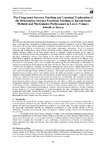The Congruence between Teaching and Learning! Exploration of the Relationship between Preschool Teaching or Instructional Methods and Mathematics Performance in Lower Primary Schools in Kenya

View/
Date
2015Author
Kamau, Boniface
Thinguri, R.Koech
Ngaruiya, B.N
Metadata
Show full item recordAbstract
The obstacles and difficulties hindering good performance in mathematics by Lower Primary school children seem to originate from inconsistence of instructional methods applied by teachers at the level. These methods don’t agree with the ones initially applied by the children’s teachers at preschool level. The effect of that could result in denying children a precious start to their future mathematics performance. There is a persistent indication that a discontinuity exists between pre-school learning methods and those in the lower primary schools. Teaching methods of the lower primary should be amended to make allowance for the stages of children’s development and provide opportunities to encourage children to improve in their ability to understand and apply mathematical concepts. The purpose of this study was to explore the impact of the pre-school mathematics programme on mathematics performance in the Lower Primary Schools of the Makuyu Zone, Murang’a South District. The objectives of this study were: - to investigate continuity of teaching methods from pre-school to lower primary school; and to compare the relationship between performance in mathematics of children who had had pre-school education with those who had not. This study used a descriptive survey design to achieve the set objectives. Purposive (deliberately) sampling was used to select a sample population of 60 pupils; a lottery (random choice) method of sampling was applied to get 30 teachers, whereas 10 head teachers were chosen through appointment (deliberate) sampling. Open-ended questionnaires to collect data from the selected teachers and head teachers were applied; and for the children's responses, an interview schedule was employed. Observational checklists were also used where archival records were to apply. To test the construct validity and reliability of the research instruments, the researchers used 'split-half'. The researchers pilot-tested the research instruments with a small representative group from the population. The data collected was analysed, using frequency counts and percentages and presentations were done in tables, bar graphs, pie charts and histograms as necessary to present a better picture of the findings. This study recommends frequent mathematics methodology seminars, workshops/in-service training for lower primary mathematics’ teachers which will guarantee effective methodological knowledge for teachers to teach mathematics effectively. Children’s learning at play should be very much emphasized. To avoid discontinuity this study recommends that in the lower primary male and female teachers should alternate to make the learners get used to male teachers. More male teachers should also get to teach in the preschool level.
Collections
- School of Education [203]
